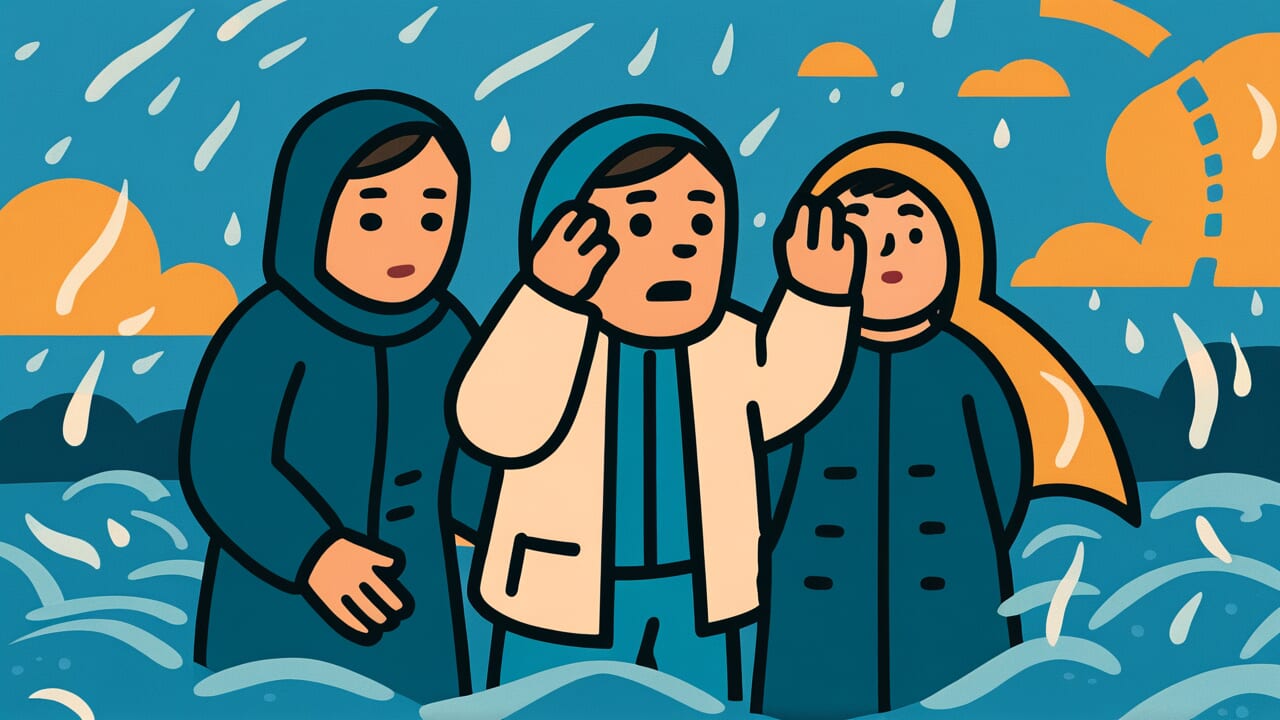How to Read “In heaven wind and rain, in people illness”
Ten ni fūu, hito ni shippei
Meaning of “In heaven wind and rain, in people illness”
This proverb means that natural disasters and illness are unavoidable trials in life that humans cannot prevent. Just as wind and rain occur in heaven as part of nature’s order, illness visits people as an inevitable fate.
People use this proverb when facing unfortunate events to show an attitude of accepting them as destiny. When someone gets sick or encounters misfortune, they don’t blame others or grieve excessively.
Instead, they calmly accept that such things happen in life. The proverb expresses this philosophical attitude.
Modern medicine and disaster prevention technology have advanced. We can now prevent illness and disasters to some extent. However, we still cannot avoid them completely.
This proverb reminds us that no matter how much science progresses, there are areas beyond human control.
Origin and Etymology
The exact source of this proverb has not been identified. However, it is believed to express views of nature and life that have been passed down in Japan since ancient times.
The parallel structure of “In heaven wind and rain, in people illness” is noteworthy. It contrasts heaven and people while showing that each has unavoidable trials.
Wind and rain occur in the heavenly realm. Illness visits the human realm. This parallel expression treats natural laws and human fate equally.
It shows the understanding that illness is as unavoidable as natural phenomena.
In Japan, there has long been a philosophy connecting natural disasters with human misfortune. Both natural calamities and epidemics were seen as workings of great forces beyond human control.
This proverb is thought to have emerged from such a worldview.
During the Edo period, common people shared a resignation that illness visits everyone. They also shared a resolve to keep living despite this.
In an era when medicine was undeveloped, people had to accept illness like natural disasters. This proverb captures the realistic life philosophy of people who lived in those times.
Usage Examples
- I took care of my health but ended up hospitalized. Well, in heaven wind and rain, in people illness, as they say.
- I thought it was unfair to get sick so young. But hearing “in heaven wind and rain, in people illness” made me feel a bit better.
Universal Wisdom
“In heaven wind and rain, in people illness” has been passed down for generations. This is because it answers fundamental human questions.
Why does this happen only to me? Why does misfortune visit even those who live virtuously? When facing such questions, people cannot help but seek reasons.
However, this proverb does not explain reasons. Instead, it frees us from seeking reasons in the first place.
Just as wind and rain have no reason, illness has no reason either. It simply happens. This way of thinking may seem cold at first.
But actually, no wisdom is more liberating than this.
You become free from blaming yourself and from resenting others. Instead of cursing fate, you can accept reality and move forward.
Our ancestors knew that life contains inexplicable absurdities. They also understood that the only way to face such absurdity is to accept it as part of nature.
This proverb contains not resignation but strength. Rather than suffering by trying to change the unchangeable, accept what cannot be changed.
Focus your energy on what can be changed. The proverb teaches this wise way of living through deep human understanding.
When AI Hears This
All systems in the universe inevitably become disordered when left alone. This is the law of entropy increase.
Milk poured into coffee mixes spontaneously but never separates again. The same principle applies.
Consider the weather system. Energy from the sun reaching Earth is not uniform but varies by location.
This variation creates temperature differences in the atmosphere. Forces work to increase entropy. In other words, they try to break down the “ordered state” of temperature differences and make them uniform.
Wind and rain are born in this process. Typhoons are essentially entropy-increasing devices that resolve extreme temperature differences between tropical heat and upper-atmosphere cold.
The human body is the same kind of complex system. Our bodies maintain a “low-entropy state” where approximately 37 trillion cells cooperate precisely.
This is a highly ordered state. But we cannot defy physical laws. Cell copying errors, viral invasions, metabolic disruptions.
These are all phenomena where order collapses. In other words, illness.
The remarkable aspect of this proverb is that it recognizes heaven and people as completely different subjects. Yet it perceives they are actually under the same physical laws.
The ancients intuited the essence of the universe without knowing mathematical formulas.
Lessons for Today
This proverb teaches modern people the importance of knowing the limits of control in life. We pay attention to health management and try to avoid risks.
That is wonderful. But at the same time, we need to accept the reality that some things cannot be avoided no matter how hard we try.
In pursuing perfection, do you blame yourself for getting sick? Do you become overly upset by unexpected misfortune?
This proverb speaks gently to you. You don’t need to try to control everything. What has happened is not your fault.
In modern society, the words “personal responsibility” weigh heavily on us. But life contains events beyond the scope of personal responsibility.
Acknowledging this is not weakness but strength. When you accept what should be accepted, you can finally focus your energy on what truly matters.
Give your full effort to what can be changed. Quietly accept what cannot be changed. This proverb teaches us such a balanced way of living.



Comments